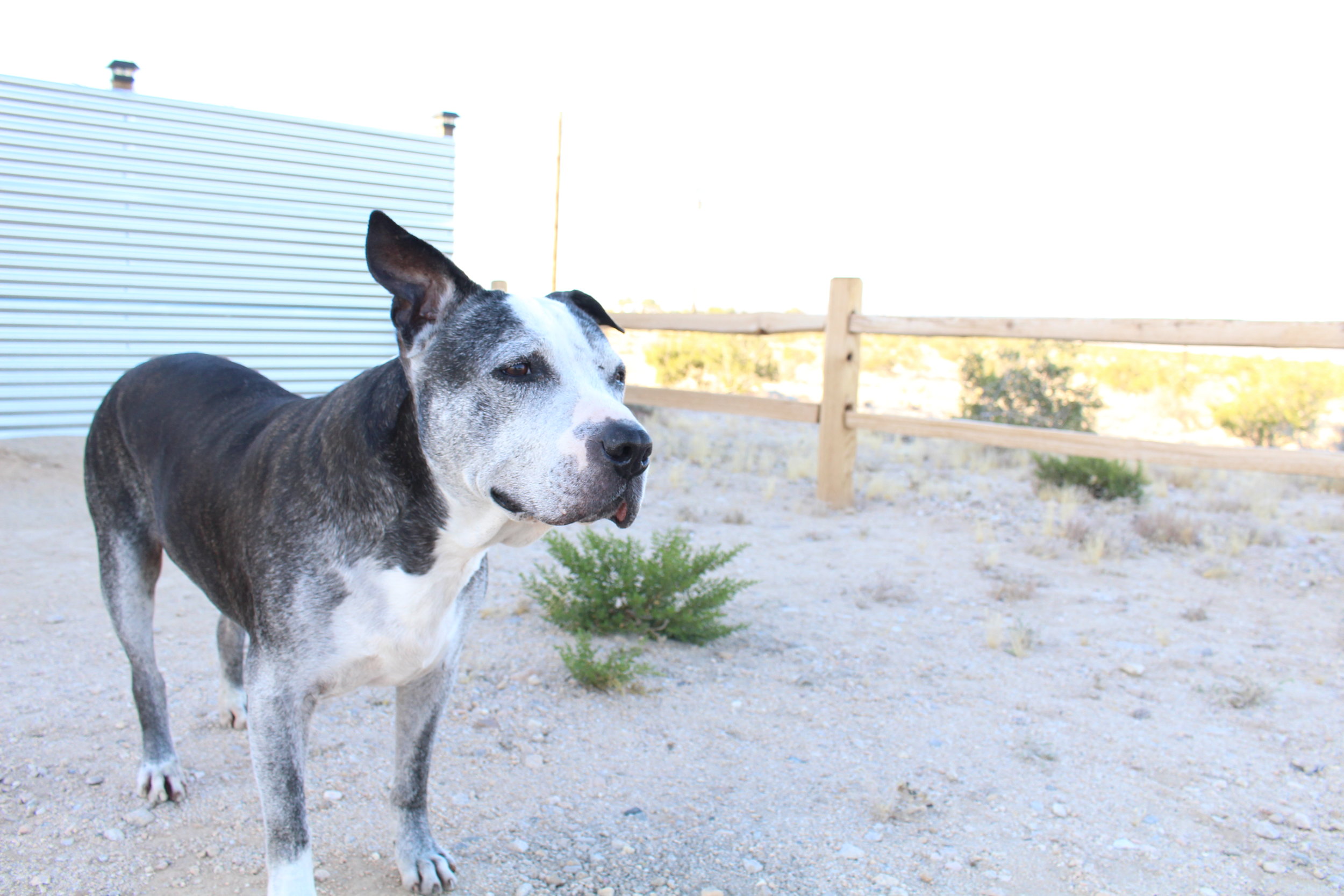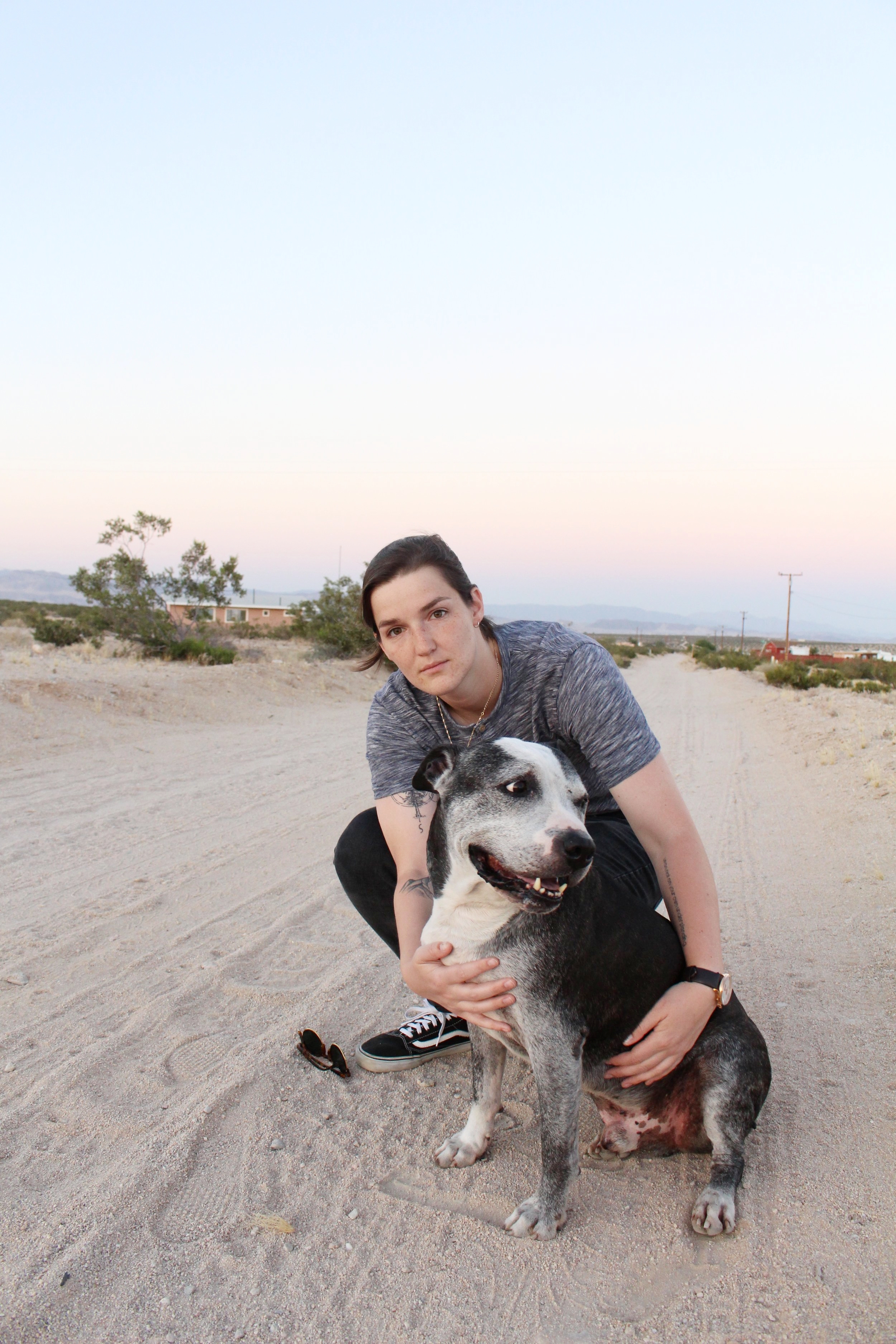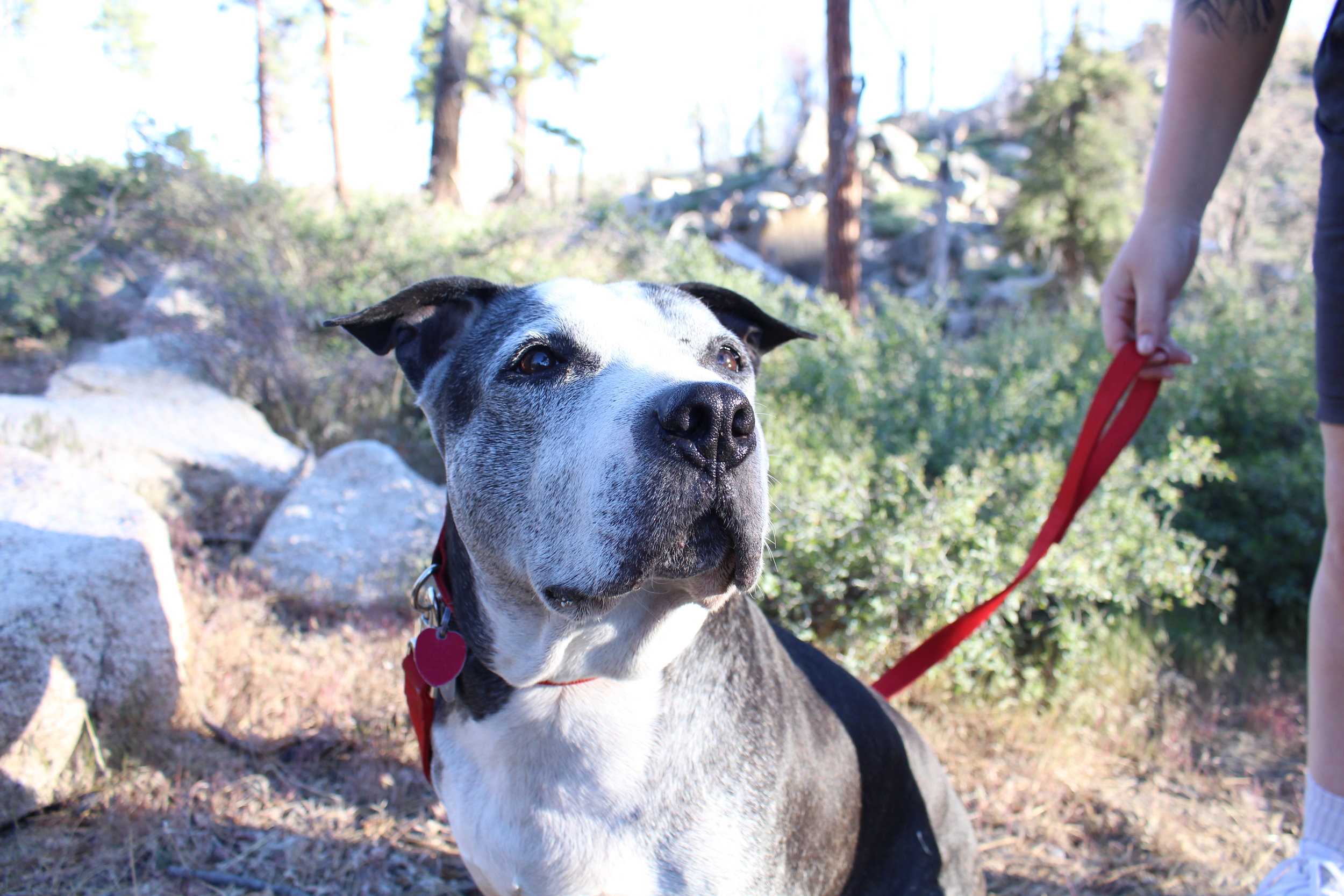Let me start by saying that I kind of hate the title of this blog post. I had originally titled it, "Our Training Journey with Casper," which sounds much more cheerful to me. But when I thought about it, the whole point of writing this post is to shed light on what it was like to have a dog with pretty serious dog aggression in the hopes of helping someone who is dealing with that issue. So I wanted to give this post a title that might help others find it. Now that that's out of the way, let me tell you about the sweetest dog in the world :)
If you've read my other posts about Casper (or met him in person), then you already know that he was an angel baby around all humans. Grace and I were always so thankful for that. However, he REALLY could not be around other dogs. We would always have (well meaning) people say to us, "but my dog is SO chill--I'm sure Casper will like him!" And sadly, we always had to respond, "No . . . seriously, Casper will try to kill your dog." But here's the good news: we were able to get Casper's issues in check and give him a peaceful life. It taught me that all things can be redeemed, and I am so grateful for all that we learned in the process.
When I started Have Dog, Will Drive, I knew that I wanted to share about this aspect of our lives with Casper, because while it felt unique (and I'll admit, at times a little isolating) to us, I know there are many others who deal with this to varying degrees. I also have to issue a disclaimer here: our experience is just that--our experience. Every dog is one-of-a-kind. What worked for us might not work for another dog. And there's a lot we won't ever know about Casper's past or what made him tick. I'm sure there are people reading this thinking, "how irresponsible that you would keep a dangerous dog that could hurt someone else's pet." Sorry not sorry, haha! Casper never hurt a fly in the years we had him. Not to toot our own horn, but we were ultra responsible when it came to his safety and the safety of other dogs. We really weren't equipped for his issues at ALL when we brought him home, but we quickly got up to speed and caring for him changed our lives. He's in heaven now, and he's not afraid anymore. He was often stressed and afraid during his time on earth. But we let him spend his final years in a loving place where he didn't have to be as scared, and I will never apologize for that.
Stepping down from my soapbox now.
In case this is the first post you're reading about sweet Casper, here's a little bit of background. He was an 80-pound older pit bull with a dark past. He was most likely fought on an amateur level, and judging by his scars, he lost most of his fights. We didn't know he had dog aggression when we adopted him. However, it quickly became apparent on walks that he would hulk out when he got near another dog. For the first year or so that we had him, going on walks was super stressful. He didn't like it, we didn't like it, and we lived in fear of him having a bad encounter with another dog. We walked him with a muzzle for awhile.
Within a few months, we started working with a trainer (who was perfectly nice, but I don't recommend and won't link here) who was all about positive reinforcement. She claimed to have worked with many aggressive dogs in the past, but we just didn't see any progress. Casper stumped a lot of dog trainers and behavioralists--they would meet him and say "he's so sweet, like a therapy dog; I can't imagine that he's aggressive." This particular trainer would use a lifelike stuffed animal dog to try to replicate Casper's issues in a controlled setting, but he wouldn't react. We spent hours (and thousands of dollars) getting him to essentially perform tricks and be "comfortable" with Grace as his handler (he was already comfortable before we began the training).
If you can't already tell, I am now a firm believer that this type of training does NOT work for many dogs--especially dogs that are large/have a lot of physical strength, are smart and/or stubborn, or have preexisting behavioral issues. Casper checked all of those boxes. Positive reinforcement training--that is, mostly just giving treats for good behavior--only exacerbated his problems, as we later would learn.
Around the year and a half mark of having Casper, we had pretty much resigned ourselves to his issues. And we were okay with it. Training was going nowhere; he was more terrified and aggressive toward other dogs than ever. We just said to each other, "This is okay. He doesn't like other dogs. He doesn't WANT to like other dogs. What we need to do is just keep him isolated from all dogs and let him live the rest of his life in peace." Right about this time, we got a recommendation from Grace's then-boss. She had heard about a very special dog trainer/dog psychologist who worked in rehabilitating abused dogs and dealing with aggression issues. Honestly, we were skeptical. But we didn't have much to lose (other than more money down the drain, haha) and decided to try it.
Enter Brandon Fouché. There are one or two things that we don't do that Brandon recommended, but for the most part, we drank the "Fouché Way" kool-aid and are big believers in his methods. This post isn't intended as a promotion of his services or a review necessarily; I'm just sharing our experience.
When we contacted Brandon's office, they recommended that we leave Casper for a full-day evaluation, during which he would be integrated with Brandon's "pack." So we dropped him off in the morning. During that entire day, Grace and I were SO nervous. Texting each other things like, "what if Casper hurts or kills one of Brandon's pack dogs? What if we made a huge mistake?" We had read the glowing reviews of people saying he'd changed their dog's life, but it seemed too good to be true. When we went to pick him up, we were incredibly stressed and expecting the worst. We walked into Brandon's office and were shocked, amazed, and crying at the videos Brandon had of Casper calmly standing in the middle of a group of dogs, unflinching. It was unreal. However, Brandon did not "fix" Casper, and it's not like we could immediately release Casper into a crowded dog park. While some of Brandon's testimonials make it sound that way, it's not a brainwashing of your dog so that they no longer have issues. The real work only begins when you pick up your dog from Brandon's facility. But we were willing to put in the work, and it did change our lives with Casper and his relationship with the world and other dogs.
We ended up having about a three-hour training session with Brandon that afternoon--without Casper. The training was for us. We had to learn how to be the alphas. Brandon explained to us that dogs are really just "wolves in dogs' clothing." The pack mentality is so ingrained, and we need to work with that rather than against it. I won't list all of the details here (feel free to Contact me if you want more information about our experience), but basically, Brandon had a strict set of rules for our interactions with Casper. The position he needed to be in the group on our walks, the way we should talk to him, etc. etc.--these were all dictated by Casper's natural position in a pack setting, which Brandon evaluated (in case you're curious, he found that Casper was mentally submissive but physically dominant). All of Brandon's rules were overall fairly minor changes. But they had a dramatic effect. Casper no longer acted fearfully on our walks. We could pass by another dog within a few feet without any reaction. While we understood that because of Casper's past, he would never ENJOY interacting with another dog, it was no longer scary if another dog was nearby. We didn't try to get him to make dog friends, but being able to just go outside with him took the biggest weight off of our shoulders. Casper finally was able to relax because we were no longer (unknowingly) giving him the signal that he needed to protect us. It changed everything.
I'll be the first to admit that the idea of not giving treats for good behavior and not using positive reinforcement didn't appeal to me because it seemed "mean." I wanted to be a loving dog mom, not strict and withholding. But what Brandon advocates is not coldness toward your dog, it's just the implementation of boundaries that will make your dog feel safe and secure in your "pack." I should also emphasize that he doesn't use any physical negative reinforcement--no physical contact, shock collars, etc. It's all about using a commanding voice, using your presence and the way you position yourself on a walk to show your dominance in the pack, and other (non-hurtful!) techniques. I would never, ever, recommend any training method that involved pain for a dog. But having rehabilitated a dog with pretty serious issues, I can confidently say that using purely positive reinforcement isn't doing them or you any favors (in most cases).
The reason why positive reinforcement isn't great (for large/smart/stubborn/aggressive dogs; I'm not commenting on ALL dogs) is because when you give them a treat for just sitting or doing a mindless trick, you're essentially telling them, "you are smarter than I am. You deserve a treat just for doing something that you already know how to do. I praise you because you are the leader of this pack." While yes, in the moment the dog enjoys the treat, it comes with mental baggage for them. It sounds silly, but the dog now thinks, "I am supreme. I get treats for doing something as simple as sitting or doing the 'shake' trick that humans like so much. If they are giving me treats for this simple behavior, then they must be beneath me. Poor humans. I must protect and defend them, and I must lead them on all adventures and outings from the pack den." This leads to increased aggression, stress, and unwanted dominant behavior from the dog. Most dogs are happier in a more lowly pack position--Casper definitely was! This isn't to say you can never give treats, but in my experience it's actually better to give them for no reason, not as a reward. Then, you appear as a benevolent leader to the dog, giving treats when YOU feel like it. If they earn the treat, then they get higher status in the pack. That signals to them that they can climb the ladder and eventually become the alpha, which is unstable for them and stressful. It's all about the way dogs think--which is very different from humans!
I asked Grace whether she had any input for this post, and here is what she said: "If you bring home your dream dog and it later turns out that the dog has some issues, do not despair. If your first attempt working with a trainer doesn't fix anything, do not despair. If your second attempt doesn't work either, do not despair." So true. Another thing Grace says that I really agree with is that if you have a "problem dog," own that label! We were always honest and upfront with anyone who would ask about Casper's issues. On walks, we'd cross the street from a block away if we saw another dog coming down the sidewalk. If people asked if their dog could meet our dog, we didn't beat around the bush--"no, sorry--he's not good with other dogs." I was initially in the camp of thinking this was embarrassing or worrying that people would think I was irresponsible for taking a dog on walks around the neighborhood if he wasn't good with other dogs. But now having seen people on walks who clearly do have a "problem dog" but don't say anything until you're about to pass them and their dog snarls at you, I understand that it IS the responsible thing to do to just be open with friends and strangers that your dog needs space, that he's not good with meeting dogs, etc. Yes, you might get some nervous glances when you say that out loud to a stranger on the street, but it's just so much better to be honest than to act like everything is fine and then have your dog snap at another dog or a person.
One last thing Grace said that I think is so important is that humans can damage dogs and abuse them, but by the same token they can also build them up. Dogs evolved to have us as their masters. Bully breeds especially REALLY want to please. They can be so devastatingly broken by people, but they also respond to and crave love and will be directed by that just as much as they are shaped by abuse, if that's what they experience.
If you have a dog with aggression issues, there is hope! However, please take this post for exactly what it is: just a chronicle of our time with Casper and what we went through in getting him to a better place mentally. Positive reinforcement might be right for your dog. Brandon's methods might not work. There's no "magic" to any of this. What I will advocate for, though, is working to better understand dog psychology in the course of any training regimen. While dogs did evolve with us, there are still parts of the way they think that run counter to what humans might assume. Dogs are amazing creatures. Wishing you the best of luck wherever you are on your training journey!


